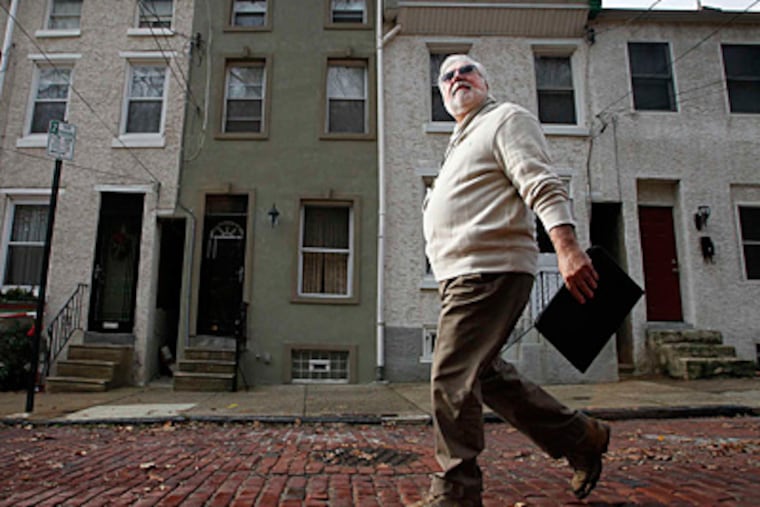Reassessing taxes: The scariest man in town
LARRY SHUBERT is only a few minutes on the job when he starts getting an earful from an 80-year-old

LARRY SHUBERT is only a few minutes on the job when he starts getting an earful from an 80-year-old homeowner. Shubert, a property-tax assessor for the city, is jotting down notes outside Theresa Conroy's home in Roxborough when she pokes her head out the door. He introduces himself, and she promptly warns him not to raise her property taxes. Or else. "I'm gonna get pretty damn mad!" she says.
Shubert is trying to figure out how much Conroy's home is worth. Maybe you've seen him, or one of the city's 65 other assessors, around town. They're deciding the market value of all 577,000 properties in Philadelphia.
What Shubert and his colleagues decide will help to determine how much each owner should pay in property taxes.
That's a frightening thought for Conroy and many other homeowners who fear that their property taxes could rise - perhaps to more than they can afford.
On the other hand, they might get a fair assessment for the first time in their lives and see their taxes drop.
For years, the city has unfairly and inaccurately assessed the value of homes. Some folks in pricey condos pay less than they should. Some in modest rowhouses fork over more than they should.
The Nutter administration is trying to fix this by reassessing every property in town. Its goal is to be finished, and to have the new bills sent out, by next December.
Who are these assessors determining what your home is worth? And how will they make that decision?
"It's Our Money" followed Shubert around on a recent sunny day in northwest Philadelphia to find out.
The ruddy-cheeked, middle-aged assessor is dressed in a tan suit - he's hoping to "blend in really nicely, so people wouldn't take pot shots" at him - and carrying a clipboard. As Shubert traipses down Aurania Street, he fills out an exhaustive checklist for each property.
When was it built? Has it been remodeled? How many rooms are there? Bathrooms? Is it a full or half bath? Is the basement finished? Is there central air? Any additions? A fireplace? A deck?
Even though assessors will take notes on every last detail of your house, you probably won't ever talk with them. They rarely go inside homes, Shubert says, because taxpayers don't have to let them in.
"When I tell them what I'm there for, they don't want to give me any information," he says.
So, how does Schubert know every minute detail about your home, from its square footage to the year you tacked on that addition for your kids?
Because he's a snoop. He scans Trend, a real-estate site that gathers data from property sales, realty inspections and other sources. He scrutinizes deeds and building permits, talks with developers, and - get this - watches you from above.
"We take aerial views of the properties," he says.
This comes in handy as he's taking notes on a quaint, two-story home, but can't see the back yard.
"Here it shows that there's an addition on the back," he says of the aerial photograph. "It's a sunroom. Now I have to go back and check to see if that's on our books."
And you thought you'd be able to build that deck without the city noticing.
Shubert stops at another house. Within seconds, he declares that the owners converted the garage into a living area. How does he know?
"Because you can see the difference of bricks," he says. "It was done within the last, say, 15 years. We don't know if they got a permit or what."
Everything on Shubert's checklist could change a home's value. So can its neighborhood. Richie McKeithen, the city's chief assessment officer, said the value of your house is determined, in large part, by what your neighbor's abode is worth.
"We'll look at properties that have sold in an area," said McKeithen. "You get a base rate of what stuff sells for there no matter what, and you go from there."
Eventually, the city will settle on a number. Then, you'll get a tax bill based on the value of your house, as well as the property-tax rate that City Council passes.
McKeithen said that he pores over data in order to be as accurate as possible. He lives for the days when a house sells for the exact amount he predicted.
"That's almost as good as, like, hitting a number or something," he said. "It's a rush."
As Shubert takes notes on a home's garage, however, he says something a little disconcerting: that he'll have to assess 13,000 properties in Northwest Philly in a year, about twice as many as one assessor should have to do.
According to McKeithen, the Office of Property Assessment is understaffed because many people have recently retired. He is working to hire about 70 more assessors soon, but staffing is a reason to worry about how well the office will be able to do its work.
Not that everyone in the city is in a hurry for the assessments to be finished. When Shubert walks to the front door of another home, a woman opens it and greets him pleasantly. A few minutes later, he comes back laughing.
"She wanted to know when she was going to have to pay more taxes," he says.